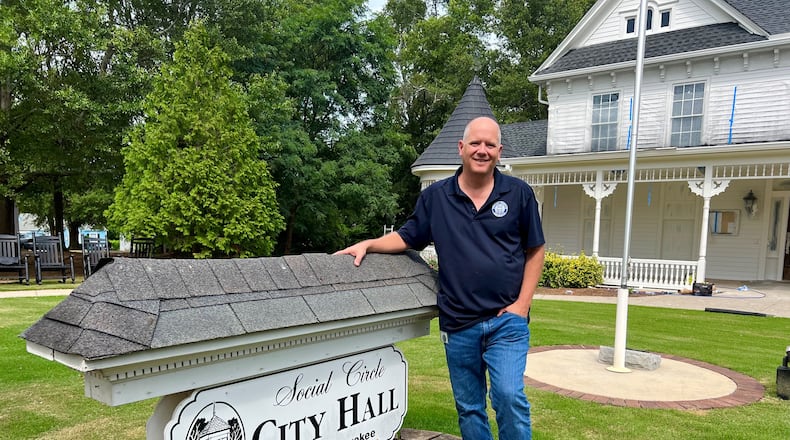The back road between Madison and Social Circle, about an hour east of Atlanta, stretches ahead like so many other country two-lanes. Green pastures mix with stands of hardwoods. Dairy farms roll past with old wood barns in the distance.
But a few hundred yards before the turnoff toward Social Circle, bright orange signs warn, “DANGER” and “POSTED AND PATROLLED.” On the other side of the signs, between Ga. 287 and I-20, sits a massive red-dirt expanse, where bulldozers are clearing 2,000 acres of former farmland to make way for Rivian’s incoming $5 billion electric truck factory.
News that the 20 million-square-foot operation would come to this country stretch between Atlanta and Augusta has been met with a mix of fear, for what it will mean for the area’s rural character, and cautious optimism for the high-paying jobs and prosperity it could bring.
That’s what took me this week to Madison, Rutledge and Social Circle, three historic towns suddenly facing a future that could look very different from their past.
My first stop was Madison, famous for its scenic horse farms and white-columned homes, where Fred Perriman is in his third term as mayor.
Perriman grew up in Madison when the schools were still segregated, but in 2014 he was elected its first Black mayor. He said even he wasn’t sure a Black man would be elected citywide then, but the outgoing mayor, who was white, encouraged him to run.
Credit: Credit Patricia Murphy
Credit: Credit Patricia Murphy
“My motto for my campaigns was ‘Let’s keep Madison moving,’ ” Perriman said.
Because Madison sits on the east side of the Rivian site and is the farthest away of the three towns, Perriman said he does not expect it to be heavily impacted by traffic or significant industrial development.
“I think it’s going to be good for our community,” he said. “We have to stay focused on our young families.” If two parents in a family are working at Rivian, they could finally afford a home in the area, he said.
“Sometimes we get older, we reach retirement age, we forget about those who are still struggling and just trying to make a living,” he said. With the proper training and a job at Rivian, he said, young people in the area “could be set for life.”
Credit: Credit Patricia Murphy
Credit: Credit Patricia Murphy
After lunch down the block at a gas station-turned coffee shop called the Sinclair, I headed east to Rutledge, which isn’t much more than a handful of small shops and cafes with a small park tucked in next to them.
A roadside box, usually used as a free library, had been turned into a tiny food pantry. “Take what you need, bring what you can. But above all, be BLESSED,” someone had written. Will Rutledge’s new $5 billion neighbor change this sleepy spot? How can it not?
Rutledge was also where I saw the most visible opposition to the incoming factory. Yard signs that used to say, “We oppose RIVIAN assembly plant,” now read, “We still oppose RIVIAN assembly plant.” Despite that opposition, including legal efforts to block it, the plant is still on track.
The last town I visited, Social Circle, is the closest to the plant, so it’s the one most likely to be impacted by what’s coming. That’s where I met City Manager Eric Taylor, who said he thinks most people are “cautiously optimistic” for what the new factory will mean locally.
“We want to embrace the identity that we currently have while accepting that change is going to happen and manage it correctly,” Taylor said.
Taylor’s prior experience makes him, forgive the pun, tailor-made to help Social Circle do that, having also been city manager for Johns Creek and Smyrna, where explosive growth from Atlanta has practically gobbled up the towns they used to be.
“I saw that I could come here and apply everything I’ve ever learned from the larger cities and keep Social Circle from becoming Johns Creek,” he said. “Do it right.”
Credit: HYOSUB SHIN / AJC
Credit: HYOSUB SHIN / AJC
The first order of business for city leaders was a temporary zoning moratorium. As soon as Rivian got the green light to build in the area, Taylor said, speculators began flooding City Hall with calls, all looking for land to build warehouses, subdivisions and more.
The city then did a unified development code, which was just approved by the City Council, to focus on bringing high-quality businesses and maintaining the town’s historic character and tree canopy, even as it expands.
Taylor also wants to plan for green space and an interconnected street system instead of cul-de-sacs emptying traffic into a single main artery.
A constant worry I’ve heard from all the leaders near the incoming mega plants across the state is that their local infrastructure, already aging, needs to be upgraded to accommodate the growth that’s coming in.
“Infrastructure is a problem,” Taylor said of the town’s systems, which are more than 60 years old. “The water and sewer system has been ignored, and it’s really time to pay the piper.”
Social Circle was encouraged by the state to apply for American Recovery Act funds for the upgrades, but it lost out to a neighboring city once the state allocated the money. It turns out all of Georgia’s cities and towns are competing against each other for the same grants for the same reasons.
Perriman is facing similar challenges in Madison. “The cost of trying to repair infrastructure is just amazing,” he said. “Every city is having these problems.”
Keeping the best of what’s there while preparing for what’s to come. It’s a challenge some Georgia towns have always handled better than others.
“People want to maintain the small town, city leadership wants to maintain the small town,” Social Circle’s Eric Taylor said. “People want to protect what’s here.”
Cox Enterprises, owner of The Atlanta Journal-Constitution, owns about a 4% stake in Rivian.
About the Author









